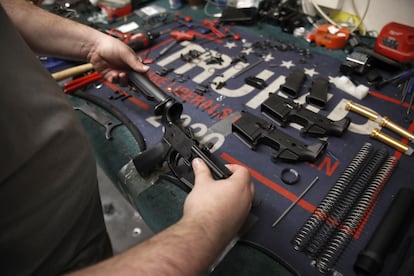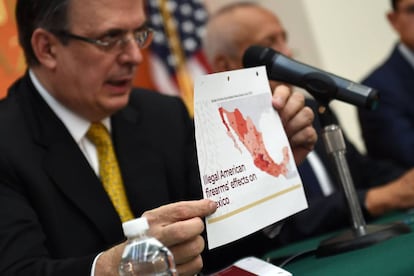Legal victory for Mexico: Appeals court says it can sue US gun manufacturers
In a historic ruling, a three-judge panel reversed the decision of a Massachusetts court to dismiss the claim against some of the heavyweights of America’s arms industry

Mexico can sue gun manufacturers in the United States. This was the decision reached on Monday by the U.S. Court of Appeals for the First Circuit, which ruled in favor of the Mexican government and revived the $10 billion lawsuit the latter had brought against some of the most important names in the American arms industry. The case will now return to a Massachusetts court, the same one that threw out the lawsuit in September 2022, to be reviewed again. “Great news,” celebrated Alicia Bárcena, Mexico’s Secretary of Foreign Affairs.
The main obstacle facing the Mexican cause is the Protection of Lawful Commerce in Arms Act (PLCAA), a law passed during the George W. Bush administration that shields the arms industry from lawsuits arising from misuse of their products. That legal shield and the immunity it provides to gun manufacturers was the argument used to originally dismiss the case in a Massachusetts court. But now, a Boston-based federal appeals court has decided that the lawsuit filed by Mexican authorities against six manufacturers and one distributor “plausibly alleges a type of claim that is statutorily exempt from the PLCAA’s general prohibition.”

“Therefore, we reverse the ruling issued by the District Court that PLCAA prevents Mexico from presenting its claim and we request that the judicial process be resumed,” reads the ruling, to which EL PAÍS has had access. The decision by the three-judge panel is historic, as it is the first time that a U.S. appeals court makes such a decision since the law protecting gun makers went into effect in 2005. “It is a great step forward in holding the gun industry accountable for its contribution to armed violence and to stop the flow of weapons trafficked to the cartels,” said Jonathan Lowy, one of the lawyers representing the Government of Mexico, in a statement.
The list of companies sued by Mexico includes Smith & Wesson, Barrett, Beretta, Glock and Ruger, producers of the most popular weapons among the Mexican cartels. The Mexican government accuses them of negligent business practices, claiming that they have deliberately marketed and produced designs meant to be attractive to criminal groups, and benefited from illegal trafficking. While drugs flow from south to north, the guns move in the opposite direction. The companies targeted by the lawsuit produce 68% of the hundreds of thousands of guns that enter Mexico illegally each year.
The case against gun manufacturers was forged during Marcelo Ebrard’s tenure as Mexico’s Secretary of Foreign Affairs. The goal was to make these companies answer for the wave of violence plaguing the Latin American country. The lawsuit dates back to August 2021 and was originally filed against 11 companies. The Mexican government has had to overcome several legal obstacles along the way, such as proving that it has the legal standing to bring the case in the United States or that the claims can be judged by a U.S. court, despite the fact that their implications affect Mexico. Mexican authorities are seeking damages to be defined by the court, but which could reach 2% of Mexico’s GDP, diplomatic sources told this newspaper more than two years ago.
“It’s a big step,” said Ebrard, who left his post in June to seek the presidential candidacy of Morena, Mexico’s ruling party. Bárcena, his successor, on Monday urged U.S. authorities to further investigate the trafficking into Mexico of weapons meant for exclusive use by the U.S. army. The issue has become a recurring topic at the bilateral negotiating table and in diplomatic meetings between the two countries, including the ministerial meeting that both governments held last week in Washington. On the legal front, the battle now returns to Massachusetts, in a process that is expected to last several years.
Sign up for our weekly newsletter to get more English-language news coverage from EL PAÍS USA Edition
Tu suscripción se está usando en otro dispositivo
¿Quieres añadir otro usuario a tu suscripción?
Si continúas leyendo en este dispositivo, no se podrá leer en el otro.
FlechaTu suscripción se está usando en otro dispositivo y solo puedes acceder a EL PAÍS desde un dispositivo a la vez.
Si quieres compartir tu cuenta, cambia tu suscripción a la modalidad Premium, así podrás añadir otro usuario. Cada uno accederá con su propia cuenta de email, lo que os permitirá personalizar vuestra experiencia en EL PAÍS.
¿Tienes una suscripción de empresa? Accede aquí para contratar más cuentas.
En el caso de no saber quién está usando tu cuenta, te recomendamos cambiar tu contraseña aquí.
Si decides continuar compartiendo tu cuenta, este mensaje se mostrará en tu dispositivo y en el de la otra persona que está usando tu cuenta de forma indefinida, afectando a tu experiencia de lectura. Puedes consultar aquí los términos y condiciones de la suscripción digital.









































